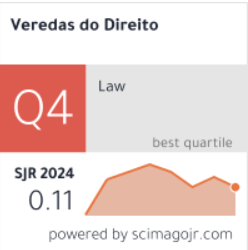TO THE RULE OF ENVIRONMENTAL LAW
WAYS TO OVERCOME THE EFFECTIVENESS CRISIS IN THE BRAZILIAN CONSTITUTIONAL ENVIRONMENTAL LAW
DOI:
https://doi.org/10.18623/rvd.v20.2515Abstract
In the 1988 Charter, environmental protection expresses constituent commands that are not optional and compel all governmentstructures, as well as society, to assume postures in accordance with the dictates of environmental protection, belonging to the core of constitutional identity. The competition of political, social and economic interests, also safeguarded by the constitutional text, with the protection of natural resources aimed at a dignified existence and the development of present and future generations, contextualizes deficiencies and omissions in the provision of environmental policies that require a reaction from the constituted powers so that the unconstitutional fault is not perpetuated. Jurisdiction represents one of the ways to implement the Environmental Constitution, formally and substantially legitimized by the principles of judicial review, as illustrated by recent Brazilian courts™ approaches to the silence or default by the Brazilian legislator or Executive Power. The change in traditional paradigms, however, affects legal relationships and is not immune to criticism, which requires reflection and analysis by the legal community. The study uses the deductive method, proposing to examine the problem in the light of the neoconstitutional guidelines of environmental protection, and carries out exploratory, bibliographical and documental research to appreciate recent jurisdictional constructions based on the effectiveness of environmental protection in Brazil.
Published
How to Cite
Issue
Section
License
I (we) submit this article which is original and unpublished, of my (our) own authorship, to the evaluation of the Veredas do Direito Journal, and agree that the related copyrights will become exclusive property of the Journal, being prohibited any partial or total copy in any other part or other printed or online communication vehicle dissociated from the Veredas do Direito Journal, without the necessary and prior authorization that should be requested in writing to Editor in Chief. I (we) also declare that there is no conflict of interest between the articles theme, the author (s) and enterprises, institutions or individuals.
I (we) recognize that the Veredas do Direito Journal is licensed under a CREATIVE COMMONS LICENSE.
Licença Creative Commons Attribution 3.0








